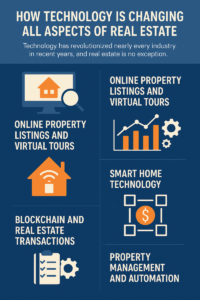Real Estate
How Technology Is Changing All Aspects of Real Estate

Technology has revolutionized nearly every industry in recent years, and real estate is no exception. Technology has reshaped how real estate professionals and consumers engage with the market, from buying and selling properties to managing and marketing them. Innovations in digital tools, data analytics, and automation have streamlined processes, improved efficiency, and enhanced user experiences. Keep reading to learn more.
Online Property Listings and Virtual Tours
Traditionally, finding a new home or office space meant relying on physical visits or printed listings. Today, however, online platforms like Zillow, Realtor.com, and Redfin have made it possible for buyers and renters to view property listings from the comfort of their homes. These platforms provide detailed information, including photos, pricing, and neighborhood statistics, enabling potential buyers to make informed decisions before ever stepping foot in a property.
In addition, virtual tours and 360-degree videos have become common tools for real estate professionals. Buyers can now explore properties remotely, saving time and narrowing down their choices before scheduling an in-person visit. This shift toward virtual exploration has especially gained traction during the COVID-19 pandemic and is expected to remain a valuable tool moving forward.
Data Analytics and AI-Powered Tools
Data is a powerful asset in real estate. Technology has made it easier to analyze large sets of data, providing insights that were once difficult to uncover. Machine learning and artificial intelligence (AI) are now helping professionals predict market trends, estimate property values, and optimize investment strategies. These technologies have led to smarter decision-making and more accurate pricing, benefiting both buyers and sellers.
For real estate investors, platforms like batchleads.io are changing the game. This tool provides a variety of data-driven features, such as lead generation, property list building, and targeted marketing campaigns, all designed to streamline the property investment process. Investors can quickly identify lucrative opportunities and optimize their strategies by leveraging big data and advanced algorithms.
Smart Home Technology
Another significant change brought about by technology is the rise of smart home features. These innovations, including smart thermostats, security systems, lighting, and voice assistants, are increasingly popular among homebuyers. Not only do they enhance comfort and convenience, but they also add to energy efficiency and cost savings, making properties more attractive on the market.
For real estate professionals, integrating smart home technology into property listings is a selling point that sets a property apart from others. Buyers today are looking for homes that offer modern, connected living experiences, and properties with smart features are likely to see higher demand and quicker sales.
Blockchain and Real Estate Transactions
One of the most exciting trends in real estate technology is the use of blockchain for property transactions. Blockchain technology offers a secure, transparent way to conduct real estate deals, eliminating much of the paperwork and administrative overhead associated with traditional methods. By allowing transactions to be completed digitally, blockchain reduces the risk of fraud and ensures faster, more efficient closings.
Additionally, blockchain technology enables the creation of “tokenized” real estate, where property shares can be bought and sold as digital assets. This opens up opportunities for fractional ownership, allowing investors to participate in high-value properties without needing large capital investments.
Property Management and Automation
Real estate property management is another area benefiting from technology. Property managers are using automated systems to streamline tasks like rent collection, maintenance requests, and tenant communication. These systems allow property managers to efficiently handle large portfolios and offer a higher level of service to tenants, reducing operational costs and improving satisfaction.














